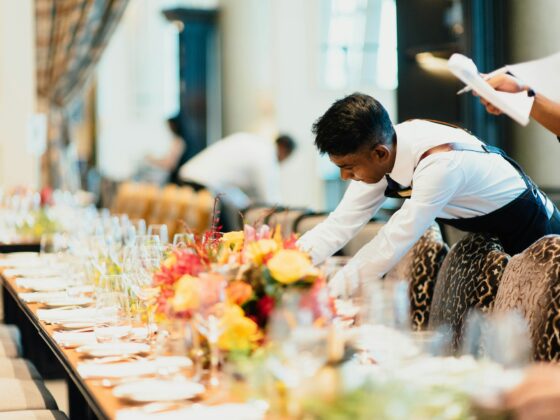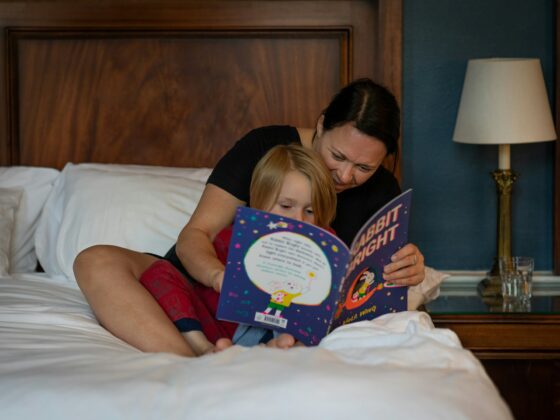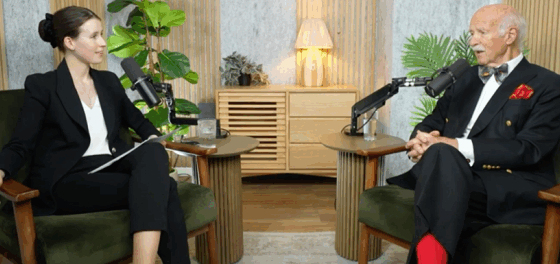Michael: I’ve learned in life that there are certain people who create inflections in your life. If you allow yourself to listen to them, where they see something in you or you see something in them. And I was a passionate aerospace engineer doing research on advanced fighter aircraft. And I got that interest in aerospace from being in the Air Force working on nuclear weapons. And I decided while I was working on my master’s in aerospace to get an executive MBA. I happened to have a classmate that was an executive with a large hospitality company that was assigned to some financially depressed assets and figuring out how do we turn them around. So I led all of the study groups on math, and she led all the study groups on marketing. And when we would get together afterwards to have a glass of wine and just chat about challenges, she says, hey, listen, we have our senior team coming in in a few weeks. I’d love for them to meet you. Spend 15 minutes just talking about what we’ve been talking. Well, that 15 minutes was a three-hour conversation. It transitioned to an offer, which I literally decided at the time, I remember going home and telling my wife I’m leaving aerospace. She thought I was crazy, but sometimes you have to follow the universe. I had the pocket protector surgically removed, the hems of my pants lowered. Really, I’m still a nerd, and I mean that respectfully, but this person talked me out of engineering into hospitality. And the exciting thing, Josiah, is that when we talked about the opportunity, it wasn’t an established position. It was a blank sheet job description. So it was meaning I had the opportunity to go in and define what the approach was and what we were going to do, which I found that to be very unique. And the trust they had in someone that had never been in the industry was one that felt right. So that’s that’s kind of how it happened.
Josiah: So you have a blank slate. I’m interested in the process. How did you approach that? If you start with a blank slate, that sounds like an incredible opportunity. It also could be overwhelming. How do you think about getting started?
Michael: Yeah. So in life, as I mentioned earlier, there’s people that make inflections on your life. I’ve learned a lot from them. I consider myself an accidentally smart person because I learned from a lot of great people and smart people. And I’ve learned from some that are not so great. But I learned that you have to assume innocence and seek to understand what the challenges are. And it’s a wrong assumption to consider that the individual or individuals are causing the problem. It’s typically not that. And being an engineer, I look at things from a process and system perspective. But I’ll tell you how I got started. I mean, this person turned out to be a lifelong friend that talked me into hospitality and her leadership was transformational. It was truly unique and still is. Right. Although she’s mostly retired, sits on boards. She said, Mike, you don’t know our industry. Figure out how we work. And it was at the property level at the time. So I jumped in. The first place I went to was laundry. Shoulder to shoulder with all of the great human beings that were working there in laundry. And I experienced the heat. I experienced the standing up for hours. I experienced the lack of linen and terry. The challenges that it was creating with the pressure to turn items around that we just didn’t have the inventory for. because the housekeepers needed it upstairs, right? So I worked with them for a while and then I went to housekeeping and did the same thing. So relatively quickly, I went to all of the areas and several things happened. I got some great insights. One, the technology was in the washers and the machines that wasn’t being utilized to give some insight as to how do we approach our day knowing what we’re going to be faced with on volume, on demand, right? Who’s coming in? What room types do we need? How many beds? How many sheets? So understanding that and that gave me insights as to what should we wash first? What should we wash second? What do we have in terms of inventory and where are we having critical points? So gain some insights, take some notes, go to the next department and so on and so forth. So when I met with Jen and I met with her often, I said, I’m ready to give you my thoughts on how we approach it, right? So I developed the methodology that looked at how do we use technology we already have and enable it to better understand what the demands are. Number two, how do we take care of our people better? And actually, that was number one, right? They don’t have mats to stand on. There is no fans in the room. There is no ventilation. The machine that we use to iron the sheets has been broken and not working properly for a long time, so they don’t have the tools they need to do their job. So when I charted out a process of how we were going to go methodically to each of the departments, what I didn’t know was that because I spent time with them, and I also learned that you don’t have to be a humble servant to human beings. So what I didn’t know was that because I spent time with them, I was already gaining trust, confidence, and support. So when I expressed these opportunities to change the process, in addition to providing them with tools and fixing this machine that’s been broken for a long time, it accentuated the buy-in, it accentuated the behavior and the culture. in the different areas, because every area had its challenges. I also realized, Josiah, that you can’t focus on the leaders doing things wrong either, right? You have to assume innocence and seek to understand. And in their careers, they’ve been taught to say the right things to certain kinds of leaders. And what you want is no filter. And I always applied a filter to the leader saying, this person’s giving me about 60% truth and 40% what I want to hear, right? And the way to do that and understand that filter is to chat with the human beings that are at the closest touchpoint to what’s being done, right? Even when you’re looking at guests, spend the time, right? Understand, you know, the cliche where the rubber hits the road. So again, as I spoke to the leaders, they realized that I’m not a threat. My desire is to understand that they too are challenged by the fact that we don’t have the inventory in china glass, silver, linen, terry, whatever it is. So I started to gain trust and confidence from and buy in from them. So, so we started at the beginning to put a methodology together. And essentially for me, I thought it was going to be a process system approach methodology. And what it turned out to be is more of a change management, cultural mindset shift methodology. It actually combined the both, right? So essentially, the way I looked at it was how I eventually named R5, right? Right person, right place, right time, doing the right thing in the right way. And how do we do that in an unbiased, objective way, being more people-centric than we are authoritarian-centric, right? And don’t hold people accountable until you’re fairly holding them accountable, right, by seeking to understand what their challenges are. So that’s kind of how I started. And you know what? Within a year, I was part of a regional team doing the same thing and kind of focusing on that methodology across 200 hotels. And that regional team gave me greater insight from a portfolio standpoint. Needless to say, it wasn’t just me, obviously, it was a team effort, but she was putting a team together. And to this day, we’re still good friends with these team members. In fact, some of them have gone to to be COOs and CEOs at various companies. And we still talk about those days. So that was the seed that was cultivated that created, gosh, the last 30 plus years.
Josiah: It’s amazing. Amazing story. I think there’s so many lessons there. I think, and this is what fascinates me about your work, is that the intersection, you work with a lot of owners and investors and asset managers. So very dialed into the financial performance and the investment world, but you see opportunities to unlock financial performance through operational excellence. And I think the process you just described shows why, right? There’s the trust. You had an excellent post I’ll link to in the show notes here, where you kind of asked this provocative question, what if the biggest inefficiencies in a business weren’t visible in asset manager dashboards, right? And I think hearing you share the story that you had, your intro to hospitality, shows why that might be, right? You have to kind of spend time with people, you have to listen, And I think in that post, you also talked about this is a science, right? Hospitality has many forms that are art, but there’s a science to this that can be learned and practiced and applied, it sounds like, in many contexts.
Michael: Yeah, I think one of the biggest insights for me, actually, no, it wasn’t an insight. It was a surprise. I was surprised. So my logic told me that for an industry that has to be customer centric or guest centric, must have the latest and greatest technology and capture of information and are utilizing this information to focus on the guest. And the byproduct would be, of course, the economic value and return for owners, the stakeholders. And it would surprise me that that was not the case. I found that the industry was creating processes and trying to get the gas to align with those processes. rather than understanding the behaviors of the respective guests at the different hotels and different hotel types and creating processes around that that can be scalable and then understanding how to do it in a very effective and efficient manner using technology, not just buying technology because the brand dictated you have to use this technology or it was the latest, but really created an enabler for you to gain the insights to understand those guests. really well. And at the end of the day, aligning the people and the processes and the technology that translates to every guest feeling the results of that, and it translating to results, it’s there.
Josiah: Interesting. I love it. I wonder if we get to talk a little bit about kind of what is on your mind now, kind of as you’re leading R5, the projects you’re involved in.
Michael: Well, I’ll be 100% honest with what’s on my mind and keeps me up, excited about how to figure out how to make it happen. We talked a little bit about innovation and creation, right? You know, I happen to think that there’s a lot of forces right now that are creating constraints in our financials and how we generate a return that’s attractive enough to continue to grow our industry in a healthy manner, right? And it’s not just about labor, because when I talk to you about technology, I’ve done revenue management side as well and how effective a sales team is in focusing on what goals need to be and so on. But what I’m looking for is someone that’s willing to work with me to understand how we can think differently, innovatively and creatively. And if you think about it, COVID gave us an opportunity to level set. And I don’t think we’re taking the opportunity to really break the mold and create a new level. and increase that waterline to a level of excellence that’s greater than it was before COVID, right? So I’m looking for someone out there that is a owner or a management company or a REIT that is wanting to partner with me to take some of these insights and apply them across their portfolio. And we could pilot it like we did at the beginning, But interesting enough, it’s not with that methodology that I created way in the past, right? Because today’s leaders and today’s owners don’t have the time or the cost to pay for that extensive of an operation. So based on the focus I am doing now, it’s an understanding from a data perspective, how we’re performing. and then isolating the biggest return for the effort and applying it there. So it might be housekeeping, it might be food and beverage. But typically what I take a look at are where’s your largest expense from highest to lowest? And are we seeing some indications there from the data analysis that I’ve created a model I created since then that says we do have issues here. potential return is this, let’s go in there and see if we can get it, right? So, so I’m looking for someone that will be as excited as I am and looking at an opportunity to maybe modify how they approach their hotels. I’ll give you a quick understanding, right? What I learned in many of the major organizations I worked with, if you are a senior VP of a portfolio of hotels or a regional VP, what you do at the end of every year is you decide your calendar for next year and how you’re going to go and visit all your hotels. Well, there’s only five. Let’s say you have 40. The data demonstrates unequivocally that there’s typically only five or six that are negatively impacting your financials, yet you’re spreading your time across all 40. Right. So the data that I’m looking at is how do we laser focus our attention on the teams and the operations that are needing surgical expertise to help them bridge that gap? And again, with the collaboration, with the team efforts, with all the methodology I spoke of earlier, but in a much less expensive, much timelier manner. That’s where I spend my time, is how do I articulate that? Because it’s hard for me to articulate a lot of things. And how do I go about convincing someone that they should do this, right?






